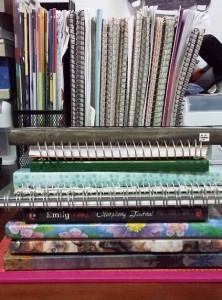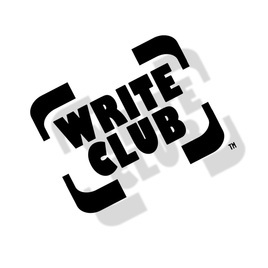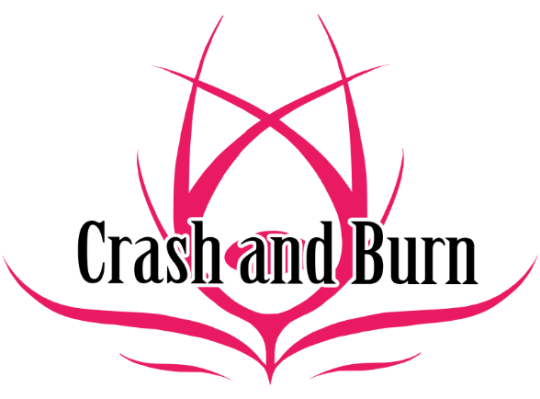Kate Larking's Blog: Anxiety Ink, page 46
September 28, 2015
Rewriting Perils

I have a backlog of rough drafts that, if they are ever to see the light of day, need total overhauls. This means rewriting.
You’ll maybe remember that I did that. At the time, the broken version had gone through several major drafts and polishes before I recognized how very broken it was.
Having so many drafts and knowing the story so well in some ways worked for me. Creating a sense of place is hugely important to me, and my early drafts inevitably lack in that dimension. Having the earlier versions helped me to know exactly where my characters were – what they heard, and smelled, and felt. I’m curious to see how the revision process will work with that layer more or less in place.
A big danger for me, however, with rewriting a story several drafts in, is divorcing the old version from the new version. There were times I didn’t question why my characters would go somewhere and do something – if it made sense for them to visit this place, to reveal that bit of information. I just sent them there because that was in the old version, and because I hadn’t really thought about it yet.
Hint: whether your characters know it or not, there should always be a why for those things.
This confusion led to me not really knowing my main character – now a first-person narrator. I knew when I was writing that her character was inconsistent, but she evened out after the first five chapters or so (with plenty more smoothing to do in revision!) and I promptly forgot.
Until my writing group took a crack at it.
Hint: get a writing/critique group. Get a good one. Because mine is excellent and so worth the pain.
Now I have a lot of work to do.

The post Rewriting Perils appeared first on Anxiety Ink.
September 24, 2015
Journaling

When I was little, I had journals coming out the wazoo. Ever since I learned to write my own name, I’ve had a journal to write in. Every trip to the drug store or the dollar store involved me looking at journals, and more often than not, asking my mom to buy them.
And I recorded all the things that I deemed important within their pages.
Around the time I entered middle school is when I left journals behind. There were a lot of little reasons, one of which is that I couldn’t stand the lack of organizing capabilities. In school I had a binder and/or notebook devoted to each subject. Given the nature of classroom curriculums, there was a logical progression in lessons that allowed my binders and notebooks to be organized. I was not so good at this myself.
Then enter my introduction to computers. I didn’t like that journals are not like word documents; I can’t go back and add in details without making a huge mess with arrows. Still, a part of me missed journaling. Every once in a while I’d break out a new coil notebook and devote it to one topic or another, only to eventually peter off and abandon it.
Honestly, school was time consuming. And I had a part time job through most of high school and university. I had to drop a lot of hobbies in order to stay focused.
While I write this I keep glancing to my left at my line of coil bound pages. They contain more things than I can remember without looking inside. Pulling one out at random, I discovered it contains quotes I like. I used to write them all out by hand….the computer has made me lazy.
Anyway, since leaving school behind, I find I have a lot more time to fill. And since I actively started to talk about writing with other writers, I’ve learned that journaling is a big thing in the community. Nearly every writer journals.
At first I was skeptical about re-immersing myself in journals. They’re time consuming. They’re a distraction. They’re messy. They’re an excuse to not get words down. They can’t be that useful.
They are that useful. I’m less uptight about the organizational issue journals present, mostly because I now use them as a place to spew ideas and jot things down about stories, settings, and characters. They’re a place for rawness. And I’ve grown to like the mirroring of the creative mess in my head.
Besides, there’s something about scribbling in a journal with my pencil that hits me on a creative level that I don’t get out of hitting the keys on my laptop. I’m a faster writer on my computer. Writing ideas out by hand lets me savour them because I have to slow my thoughts down.
I will never be like Melissa and be able to write a story out longhand. I admire her for it, but I would need hand surgery at the end and thicker glasses for the transcribing. Neither will I ever be like Kate and colour code my pages with fancy pens. I’ve tried, and when I get caught up I forget to switch ink.
Give me a pencil and a blank page and I’ll happily fill it with disjointed story thoughts that are barely legible with my chicken scratch.

The post Journaling appeared first on Anxiety Ink.
September 23, 2015
There’s Something About Fall – Autumn and Writing

There’s something about fall that makes me want to write. Autumn and writing just go together. Just as the leaves start to turn golden, when I can smell the changing weather when walking to the bus stop for work, I just want to write. I’m not entirely sure what it is.
Part of it, though, has to be that I have been conditioned for years and years with the “back to school” routine. Summer starts to cool down and not its time to get some shiny new stationery, brand new notebooks, and start learning, reading, growing.

It’s also my usual convention season. It starts a little early with When Words Collide, but then there is Sirens in October over in Denver. Usually I also go to World Fantasy Convention which I sadly cannot make this year. That gets me revved up for all sorts of writing, dreaming, story ideas, and intense conversations about themes of fantastic writing especially how it deals with diverse populations. Just thinking about conferences coming up I get the itch to do *more*.
Already this fall I have:
Written a shit-tonne of words at a write-a-thon that may actually be useable.
Done two epic plotting sessions for the Crash and Burn comic to get the storyline full and ready to write faster.
Hinted at starting back into a collaboration writing project novel.
Moved forward with the plot for the draft challenge I have with Elisa–including working through a stumbling block and being open to changing the structure of the book
Gotten the back-to-school flu/cough/half-death of the sinuses. It’s part of the whole process, I think.
Do you have a favourite season for productivity?

The post There’s Something About Fall – Autumn and Writing appeared first on Anxiety Ink.
September 21, 2015
After Action Report: Playwriting

I am exhausted. Maybe because I’m getting old (you know, now that I’m officially in my third decade), maybe because I haven’t been eating terribly healthy the last few days, or maybe because my sleep deficit has reached a recent extreme. Most likely, it’s all of the above.
The 24 Hour New Play Festival was fantastic.
Friday evening, I raced from work to the grange hall hosting the event, and for which the event is a fundraiser. (Because how else does rural Maine do things but through grange halls?)
We had four adult teams and two youth teams. Everyone arrived knowing their roles, and names were drawn out of a fish bowl. First the writers, determining order of performance, then directors, then actors.
After a few ice breakers, we broke into our teams for improv games to give writers and directors a feel for the actors’ range, and maybe help kick off a few concepts for the plays. In one of the games with my team, a parking garage was mentioned. My brain immediately decided that the parking garage needed a monster.
So that’s what I wrote. I got home at 10:30pm and crawled into bed around 1:30am, to get up at 6 to look it over before I sent it out. It was creatively titled The Monster in the Parking Garage.
Some of the language was pure vanity on my part and should have been cut, but it was little better than a rough draft, so I’m not too bothered by that. The actors did a phenomenal job creating characters, and the director was hands-down awesome. (Currently, I’m considering polishing it a tiny bit and putting it up on my sadly neglected personal blog because it was fun to write and I like to share these things. What do you think? Yes? No?)
Performances started at 7pm Saturday night. We had a decent audience turnout, all forgiving of the scripts onstage. The directors introduced each show, than at the end all the writers came up for a talk-back where the audience asked questions and made (constructive) comments.
It was a fantastic experience – terrifying, but fantastic – and I would definitely do it again.
Just not right away.

The post After Action Report: Playwriting appeared first on Anxiety Ink.
September 17, 2015
Metatexts, Parodies, and Retellings

There are a lot of definitions and understandings of the word ‘metatext.’ Today, I’m working with this one: ‘A text lying outside another text, especially one describing or elucidating another.’ Thank you Oxford Dictionary.
In the middle of August, a friend of mine invited me to the movies. We ended up seeing the newest Vacation movie because we wanted a laugh and the time worked for us. I’ve seen the original, years and years ago. I don’t remember it like I do The National Lampoon’s Christmas Vacation, which I’ve seen more times than I care to admit.
Even though the revamp was about the Dad recreating the vacation he went on with his family as a kid, it stood well on its own. There was a great moment where he reminisced about the original Vacation (movie) and the audience members old enough to understand what he was talking about smiled. We all love being in on a joke.
That’s the whole point of a metatext as far as I’m concerned. You create a story that references another, which makes certain members of your audience happy. But you also create a whole story that makes the rest of your audience happy. You cannot rely on that original text to which you are referring to hold your story up. Otherwise you’ve created a parody.
Don’t get me wrong, parody isn’t a bad thing as long as that’s what you’re actually striving for. And it’s good. And still stands on its own.
In my younger years, I used to hate metatexts, parodies, and retellings. Anything that referenced something else in order to make sense piqued my nerves. It drove me nuts that people couldn’t come up with their own ideas.
As I’ve matured and learned more about the art of storytelling, I’ve grown to enjoy the good ones. “Good ones” are true metatexts that can stand on their own without the text to which they’re referring (yes, I keep repeating that point). They’re also good art. For instance, the entire Scary Movie franchise is an example of bad metatexts and parody. I don’t just mean the bad acting and the bad story lines, I mean the fact that you have to have seen the movies they reference for you to get a modicum of enjoyment out of them. Yes, I’ve seen those movies more times than I will ever admit, too.
It ultimately comes down to the fact that there are no original stories left to tell, only new ways to tell them. The ways in which we tell stories are the basis of creativity. I love good meta and I love good parody. I’ve never tried my hand at either, but my career is young and there’s time to grow brave enough to dive in.
How do you feel about retellings like the ones I’ve talked about?

The post Metatexts, Parodies, and Retellings appeared first on Anxiety Ink.
September 16, 2015
Word Budgeting

I’m doing math. I know. Totally not writing. But it’s for writing so it counts, right?
Over Labour Day weekend, I attended a writeathon put on my Write Club here in Calgary. I could only attend for two of the three days, but I made it count. My goal was 9,999 words, just like last year. This year, I managed to make it to 10,065 words in the two days I participated.
Learning moments:
It’s amazing how fast you can write when your character is doing something you want to be doing. (My character was taking a bath and I was desperate for one at that point).
Reclining on a sofa to write that much will cause all my stress to lock up in my shoulders. Sitting properly at a table is where it’s at.
Setting a goal you don’t think you can hit is the best way to give you a confidence boost when you actually hit it. Breaking that down further, thinking that you CAN hit it is far more motivating and empowering than thinking you can’t at any given time.
So, now, back to the math.
My main word budgeting math question is:
How many words per week to meet my January 5th goal?
Answer:
If I’m drafting to 60,000 words, less what I have already written, I need to write 3,040 words per week.
If I’m drafting to 80,000 words, less what I have already written, I need to write 4,257 words per week.
Spreadsheets are my friends. They make this kind of math easy.
I calculated by week because calculating by day is stressful. Sometimes, you’re going to have bad days and holding yourself to strict words/day will defeat you even more. Sometimes, you’re going to have great days and you want those to roll over to give you time to relax, say, around Christmas/holidays.
The main thing I wanted was a manageable goal. I’ve been NaNoing for a few years and it gives me a great surge in words, but it ultimately harms me. I get really really tired of writing. If I make my goal, I don’t want to write. If I don’t make my goal, I don’t want to write.
I want to take this at a more relaxed pace and enjoy the art of writing again. I don’t need to live my writing life a month or three a year. I want to live my writing life over my entire life.

The post Word Budgeting appeared first on Anxiety Ink.
September 14, 2015
Breaking Writing Taboos

My writer brain is on a roll. Which is all to the good as I’m gearing up for the 24 hour new play festival this weekend. (In related news: I’m not getting any sleep Friday night.)
Apparently, finished the rough draft of a short story gave my brain license to add another project. So now I’m juggling three novel rough drafts.
This newest . . . has taken on a strange naming convention. Strange for me, anyway. In general, I avoid naming characters after people I know (or have known).
This is not to say I don’t know anyone named Sara, or Anna, or Jacob. But for me there is a vast difference between picking a name that fits the character – which also happens to be the name of this friend or that acquaintance – and drawing from people I know to name a character.
But this new story was nagging at me. I did what I could without naming my main character, then had to stop. Like any procrastinating writer, I took to social media to whine.
Then a friend volunteered her name.
You know what? It was perfect. And it has apparently kicked off a trend. I have broken my own taboo for this story, and so far everyone is named after someone I have known at some point.
I’m having fun.
Does anyone else have their own writing taboos? And have you ever broken them?

The post Breaking Writing Taboos appeared first on Anxiety Ink.
September 10, 2015
Striving for Accountability

Admittedly, I haven’t been writing “seriously” for very long. By which I mean I haven’t been writing with the intention of drafting a manuscript, selling/publishing it, and doing that over and over.
Yet, in the three years I’ve been writing, editing, and sporadically submitting my stories here and there, I’ve had nothing but positive feedback. Before you hate me, positive does not mean I haven’t received rejections, and I have not sent out a lot.
Nearly all of the rejections I’ve received have been personally written and bolstering. I’m always encouraged to keep submitting and writing. Even the writing workshops I submit to send me away with a reason to keep doing what I’m doing. Do you think that’s buoyed my spirits and made me itch to get my butt in my chair and write?
Yes, and no. Despite my best rationalizing and self-analyses, I’m still resisting just getting the writing done.
No one likes having their work rejected, but that’s the name of the writing game. I don’t dwell on it, and to say that I do even on a subconscious level would be making up excuses for not writing.
At WWC, while we were outside taking a break during our workshop, I told Kate that our first WWC was a revelatory experience for me. I was so inspired and excited to write. I had so many ideas that I was itching to get on paper. I started a few stories, picked one I felt I could go all the way with, figured out my world, outlined, and wrote quite a bit of it. Then I got stuck.
At our third WWC, all I could think about was why the hell I don’t have a manuscript written yet. Kate expressed similar feelings.
For me, it comes down to a lack of focus and a lack of a deadline -and this weird belief that I need to carve out solid blocks of time without interruptions to write instead of writing whenever I can, like others do. I’ve learned that I am a person that needs a driving impetus to complete a difficult task. I need accountability, dammit.
So Kate and I have set a date to finish at least a first draft of our current projects –January 5th, 2016. We’re competitive enough to goad each other into accomplishing this feat, and supportive enough to get each other through it. At least we hope so.
Wish us luck! We need it.

The post Striving for Accountability appeared first on Anxiety Ink.
September 9, 2015
When Words Collide 2015 Recap – Script Writing for Comics and Graphic Novels

This week in my When Words Collide 2015 recap, I want to talk about the script writing for comics and graphic novels panel I went to. Panelists were: Daniel Abraham, Rick Overwater, Ryan Ferrier, Patrick Weekes, and GMB Chomichuk.
In case you haven’t heard, I have been working on a comic project called Crash and Burn. Did I know anything about writing comic book scripts going in? Err, not really. Just that it was something akin to writing screenplays and that you had to be mindful about panels and page breaks when it came to script writing (a nugget of information I gleaned from when Holly Black presented at Sirens in 2010).
In script writing for comics, it’s different from fiction where you work directly with an editor. While you might require working with an editor, the primary working relationship you have is with your artist. The artist may prefer detailed scripts or what is referred to as the “Marvel-style script” where you have beats written for pages, say, 1 through 5 of “Big fight!” and a few foreground and background details that the artist can work in at their discretion over the five pages.
What decides on the type of script you write? It all depends on the artist. The writing is on the page to make the art and the artist shine. This mean there will be splash page or silent panels to enable the artist to best convey the emotions of the character and the artist’s skill.
And not every artist and writer will work well together. The panel likened developing a working relationship to dating. At the first date, you need to feel out the concept and see if it is a match. If it’s not a match, then by the third date, the conversation will be hollow and curt and, in all likeliness, the comic won’t convey the passion and chemistry you want.
It’s just like writers working with agents and editors. It’s not about establishing a working relationship because you are both at similar levels–you have to work well together, share a vision, and need to endorse the final production.
So if you want to get into comic writing–what can you do to ensure that you and your artist fit creatively together? You want to be the art director of your script. You want to make a mood board of work that the artist you are approaching has done so they know what you are expecting. If the artist is new, find other images to convey that tone and mood you want in your work.
Find out from the artist how they want to see their scripts. Really detailed or do they want more free reign? Ask them for a copy of a script they really enjoyed working on and compare it to the final product.
When working, convey where the most effort needs to be placed. If you have an infodump page 11 you aren’t too picky on but you want the art for the wow moment on page 14 to really shine? Tell the artist. Let them budget the time accordingly. All working relationships work better with solid communication as a foundation.
If you want to learn more, Rick Overwater had a nice list of resources on his website.
There were a lot of other panels I went to that I would love to write about, but I know so little on the subject matter that I don’t feel comfortable relaying them. It’s either that or not notes don’t make sense. So, next week, not a WWC2015 recap post! Something new! AKA Something wicked this way comes.

The post When Words Collide 2015 Recap – Script Writing for Comics and Graphic Novels appeared first on Anxiety Ink.
September 7, 2015
Writing Practice

Writing practice was something we did in school, right? We know how to write. We know how to craft a sentence, a paragraph. Writing practice is something we don’t have time for. There are stories to write and deadlines to make.
Right?
Um, no. In case you hadn’t already guessed: no.
Free writes, journaling, stream of conscious blather – we don’t necessarily think of it as practice, but it is. It lets us play with ideas, with different approaches and styles, taking risks that we wouldn’t otherwise.
One great, vastly underutilized tool in the writing practice department: letters. Few people do them any more. Kate can attest that I am a horrible correspondent. (In my defense, my last letter was returned for no apparent reason. Which was discouraging.)
But letters are a great way to help you find your voice as a writer. You know, that thing that no one can teach you?
Because letters are conversational. The tone changes, depending on whom you are writing to, but they are all you. All your voice.
Stories, in both dialogue and exposition should (according to current market trends, at least) sound natural. By which I mean it should flow in such a way that the reader is not thrown out of the story. Making readers work to understand convoluted grammar or excessively long sentences throws them out of the experience.
Note: these are all generalizations. Of course, your mileage may vary.
Schools often teaches us a way, a tone of writing that works against easy accessibility. Letters to your best friends? Those tend to teach the exact opposite.
So keep up the writing practice. Get all the extra words out of your way so you can get to the ones that matter. And if you’re having trouble finding your voice, try writing a few letters. You don’t even have to send them. Just write them as if you were talking to your best friend.

The post Writing Practice appeared first on Anxiety Ink.
Anxiety Ink
- Kate Larking's profile
- 53 followers







